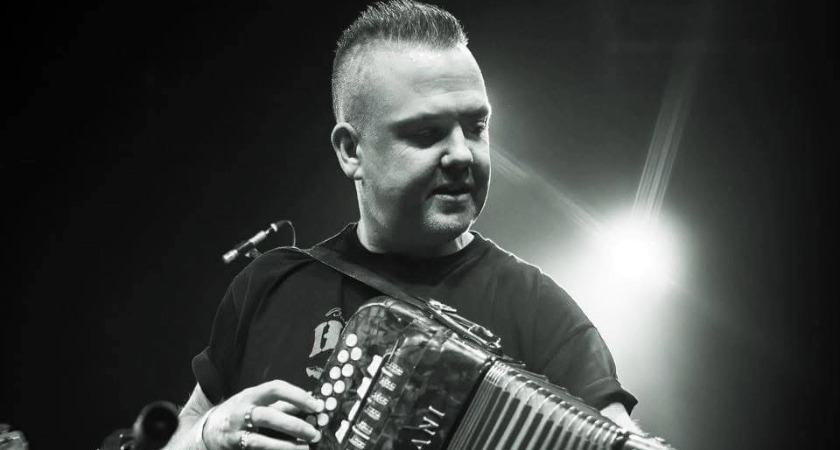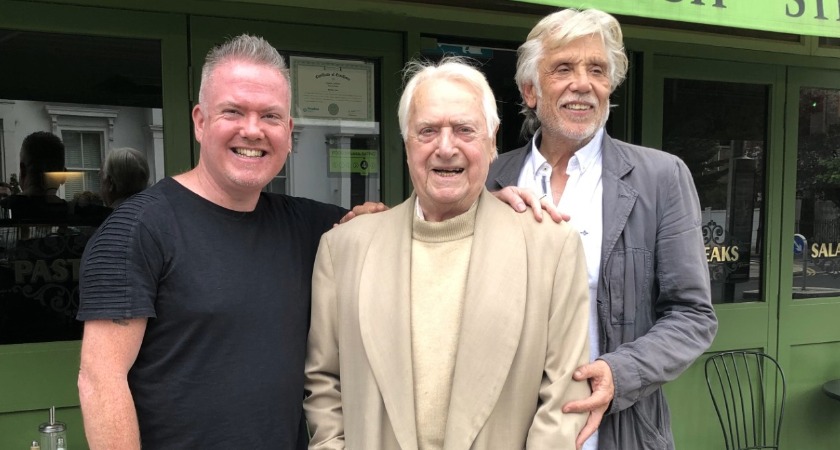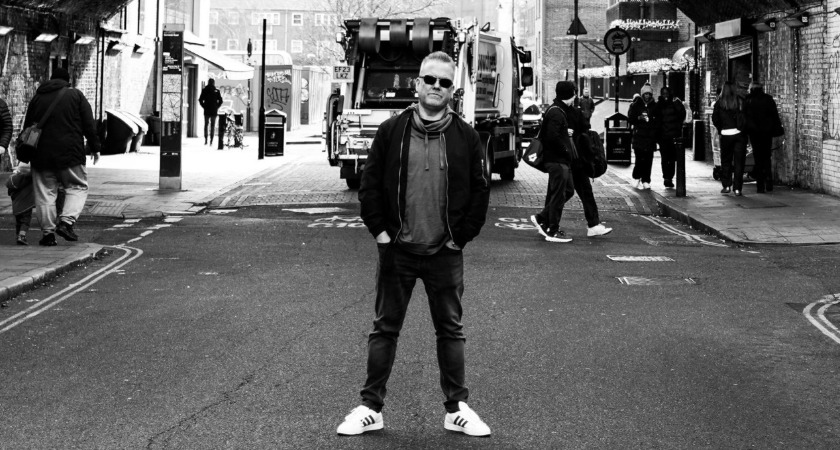"PEOPLE have become very successful in this country but some of them have done it by methods that most people might deem unscrupulous," says Andy Nolan. "It would be frowned upon in most Irish Catholic circles what these mostly Irish Catholic people did."
Nolan is talking about some of the people featured in his forthcoming true crime book, Green Bloods. It tells the stories of Irish figures in the London criminal underworld — men and women who often stayed in the shadows, pulling the strings, while others preferred to steal the limelight instead. The book is being launched in October on a night of celebration featuring live music, a book signing and a Q&A with people featured in the book. However, the convivial nature of the event is at odds with the subject matter, which looks at the impact and influence of Irish people on crime in London across centuries.
The book has been a passion project of Nolan's, which he has been working on for the best part of a decade. However, idle hands are the devil's workshop and Nolan — himself a second-generation Irishman with parents from Co. Longford — threw himself into completing the book after departing from the BibleCode Sundays last year. His latest project is another testament to his creativity, coming after almost two decades as accordion player with the BibleCodes and other bands, writing and directing short films and recently launching a new podcast, with a second in the works. But whereas the stories of the Irish in London are often tales of success and celebration, true crime buff Nolan has instead focused on a murkier world.
"The way the Irish built Britain and the western world is a story we should celebrate and be proud of but for me as a true crime enthusiast, I was drawn to these sorts of characters because their story hasn't really been told," he says. "Not every person who came here was a successful emigrant — indeed a lot of people did get forgotten. It's important to get everyone's story told, whether it be good, bad or indifferent."
Poverty, opportunism and anti-authority
Nolan explains that some of the Green Bloods of the title were born into criminality, some had no other option but to turn to crime to support themselves and their families, while some — well, some just had a rebellious streak and wanted to rail against the system.
"I think it's really important that people understand the poverty that these communities came from, especially through the years of the Great Hunger," he says. "It's important to know what drove their descendants up to the 1950s and onwards up to the present day to become really successful on the backs of those early street gangs, the guys and girls who came over here in the old days. That wave of Irish immigration here from the 1950s onwards, that's when I really found that the Irish were peaking in the London criminal underworld. I don't think it's a coincidence that with so many people coming over here — a lot of them still very poor — that a lot of these guys chose criminality as an easy and quick way out.
 Nolan used to play accordion with the BibleCode Sundays and is still performing with other London Irish bands (Image: Pete Kingston)
Nolan used to play accordion with the BibleCode Sundays and is still performing with other London Irish bands (Image: Pete Kingston)"But it's not just poverty or opportunism that got these guys into this world, a lot of them are anti-authority and it's almost in their DNA, in their psyche and, being of Irish heritage, that rebellious streak is always there. It goes back to Irish highwaymen, which I've touched upon in this book as well — there's a long history there of rapparees. A lot of Irish soldiers came back home from the Williamite wars supporting the Jacobite side to find they were homeless, their lands dispossessed and they had nothing to return home to after losing that war, so a lot of them became highwaymen before moving from Ireland to London, where the real spoils of the empire existed."
The book charts a long and lawless history, beginning with those highwaymen targeting the well-to-do of London and moving on to those fleeing the Great Hunger who joined — and eventually led — street gangs in the English capital. It looks at organised gangland crime of the 1950s, Irish bank-robbing crews in the 1980s and 1990s and later, London Irish families who attempted to build drug empires. It examines those who lived hand-to-mouth, spending as quick as they could steal, as well as others who got rich investing their ill-gotten gains in legitimate businesses.
Rogues' gallery
The book features some familiar names, others less so. People like Terry Ellis, who pulled off what police described as a real-life Ocean's 11 heist, as well as the Irish members of the Krays' gang, who plotted to overthrow the brothers only to be placated by leading Krays associate, Dublin-born Albie Donoghue. It also includes Billy Hill, a robber who moved into smuggling, reformed criminal Noel 'Razor' Smith, who has spent most of his adult life in prison and Ray Bishop, who at one time was Britain's most wanted man.
Nolan says that while some of those featured pop up here and there in other true crime books, there was rarely a deep dive into their personas or their Irish heritage, of which many were fiercely proud. Recognising there was an almost encyclopaedic breadth of material, as Nolan says himself, if no one else was writing it, why shouldn't he?
"I started reading a lot of true crime books and learnt a lot about the Italian-American experience," he says. "A few Irish-American crime books started coming out and there's loads now but at the time I first started reading true crime books, there wasn't that many. Some of the authors weren't really delving deep into the Irish characters. They were fascinated by the Italian experience and where they originally came from in Sicily and I was reading these books, thinking, 'Why are the Irish not getting that attention to detail?' It's been a trait down through the centuries where the Irish experience throughout the world has been overlooked and dismissed and I just wanted to rectify that a bit.
 Nolan with Bobby McKew, who was Billy Hill's right-hand-man, and Michael Emmett of the Emmett crime family
Nolan with Bobby McKew, who was Billy Hill's right-hand-man, and Michael Emmett of the Emmett crime family"These characters that I've profiled, interviewed and written about, you could almost equate them to the 'Forgotten Irish', those who ended up alone in London and other cities and never went home. But there's also a Forgotten Irish who didn't become a priest, who didn't work on the building site, who didn't become a barman, who took the path of criminality. Some of the people I've included in the book are household names and you'd be surprised that they're actually of strong Irish heritage but others, some people won't have heard of. I just realised there was an extensive book there for someone to write and no one seems to be writing it and I thought, 'If no one else is going to do it, I'm going to do it'."
So just how deep does the green blood run in the capital? Nolan says he could easily write a second book about London, while some of those who 'respectfully refused' to participate in the project could make for a book on their own. He respected their wishes, hopeful he can tell their stories on their terms when the time is right.
"It was a little bit disappointing because some of these characters I considered would be the jewel in the crown of this book but I found plenty of other diamonds in the rough along the way that more than made up for it," he says. "A lot of them were lieutenants or second-in-command but the reality is they were running these outfits. They had dreams of taking them over, they were serious criminals. A lot of them liked to fly below the radar, whereas the Krays liked to be seen in public with film stars. A lot of these Cockney Irish guys really shunned that, they didn't want people knowing their business and that's why there were divisions and friction within that Krays firm. A lot of it was the twins going up against the Cockney Irish members of their outfit, who considered themselves serious criminals and didn't really see the Krays as such."
'Powerful and respected'
Nolan says the London Irish criminals were a unique breed. They may have looked and sounded just like their neighbours but there were little differences in their youth which often foreshadowed the larger divisions they would later experience in their criminal dealings.
"A lot of these guys were very aware they were different from their English neighbours, even if they did have Cockney accents," he says. "They went to Mass, they went to Catholic schools, so lines were already being put down while these guys were youngsters. They were very aware they were different and there was the anti-Irish prejudice that some of them encountered. They are very aware of their Irish roots and are proud of it.
"A lot of these guys served in Category A prisons in the '80s and '90s and found themselves sharing a cell with a lot of Irish republican prisoners who were in British jails at that time. They forged really good friendships out of that and it gave them even more respect on the prison wings, these ordinary decent criminals getting on really well and forming close bonds and friendships with IRA prisoners. It was something English prisoners couldn't do because they might not be able to relate to an IRA man, whereas a second or third-generation Irishman here would. There were bonds being formed there, they realised they were — albeit with Cockney accents — different from other English prisoners. They became quite powerful and respected because they could move in those circles, the same way an Italian ordinary decent criminal going into an American prison might form bonds with Mafiosi because they have cultural and ethnic bonds. That was the experience of a lot of the guys I interviewed in Green Bloods."
 Nolan has taken an in-depth look at the lives of those involved in the London Irish criminal underworld (Image: Paul Gallagher)
Nolan has taken an in-depth look at the lives of those involved in the London Irish criminal underworld (Image: Paul Gallagher)The book, which will be available both in print and digitally, is being launched at the London Irish Centre in Camden on Saturday, October 11. London Irish bands Hungry Grass and The Monday Club will also be performing at what Nolan describes as a night of celebration as Green Bloods is finally released. Some of the people featured in the book will also be there, although, Nolan quips, 'I'd love people to come down, they've got nothing to be afraid of!'.
"All of these Green Bloods that will be there on the night are reformed criminals, most of them have found God, they are very spiritual these days and are not the people they were in their youth," he adds. "A lot of them are very remorseful, they've gone into the straight world, some of them have started running their own businesses and are very successful.
"A lot of these guys, in different circumstances, would be very astute businessmen and women in the straight world, they would have been very successful but the cards they were dealt didn't work out that way and they were hooked into criminality from a very young age. They dropped out of school, not necessarily because they weren't bright but because they were quite rebellious and didn't appreciate authority too much. They took their own path but they were still very bright and some of them have gone into the straight world and set up successful, legitimate businesses."
On what promises to be a memorable night for a fascinating book, it would be criminal to miss it.

